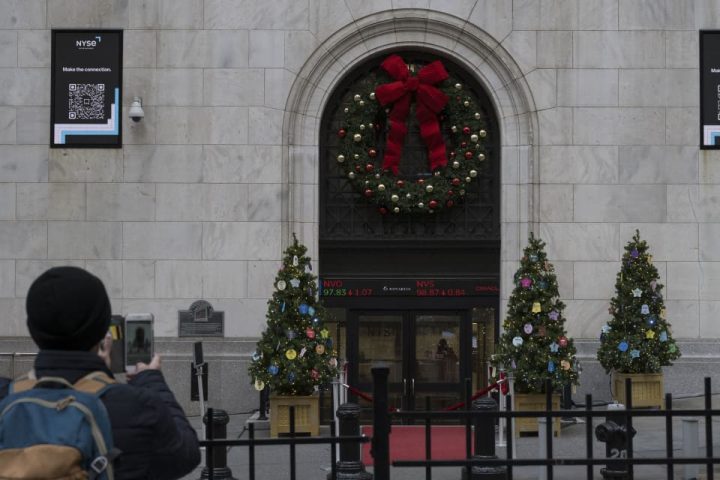‘Tis the season to be jolly? The S&P 500
SPX
is teeing up for its best week in roughly a year, with Thursday’s blowout performance nudging some to say the year-end rally is under way.
“Stocks behaved as if the end of tightening is equivalent to rate cuts themselves,” says Michael O’Rourke, chief market technician at JonesTrading, of a big factor behind that rally — the view that the Fed is done hiking for this cycle.
A softer nonfarm payroll data has taken the sting out of Apple disappointment, with stocks following up that big move with gains on Friday.
The year has been full of touch-and-go rallies, as this chart from Mott Capital Management’s Michael Kramer shows — he highlights a 3-wave pattern for S&P 500 rallies since mid-July:
Our call of the day from RTM Capital Advisors’ chief investment officer and portfolio manager, Mark Ritchie II, says there are clear signals to read for investors who want to know if they’re walking into a “monster bull trap,” especially after Thursday’s big move. A bull trap happens when investors buy a stock or market thinking a selloff is over, only to get trapped and lose more money as selling resumes on that asset.
“We’ve been in a pretty nasty tape really since the end of late July, early August…the peak to trough decline in the small-caps was close to 20%. You almost had a bear market decline within a larger decline over the last few months,” Ritchie told Real Vision in an interview late Thursday.
“This entire year we’ve seen momentum-driven snap backs rallies in equities and the breadth doesn’t confirm really….the overall participation from stocks has been lackluster all year,” he said.
While some will chalk up Thursday’s rally to short covering — buying specific stocks to close out a bearish position — or a so-called dead cat bounce, he sees slivers of hope. “I think it was constructive to say this rally has a little bit of juice because we saw better than nine to one buying volume, nine times the upside versus the downside,” on the NYSE, he said.
But he also says he’s sitting on “an awful lot of cash,” right now as he waits for real clear signs of whether the real buyers are showing up. “Right now, we want to be watching [to see] is this rally initially met with distribution or selling. If you look since the highs in late July, August…we have not had more than a couple of days rally that has not been met with distribution,” he says.
He defines distribution as “a down day in the general market on higher volume than the prior day.”
“And so even looking at the strongest of the indexes, say the Nasdaq
COMP,
when you had a day like yesterday or today, within three to five days, it has been met with selling,” said Ritchie.
“Are you getting buying? And then as you watch in subsequent days, if there’s no follow-up buying and then you see a lot of net selling coming in, that tells you what you need to know, meaning there’s still supply out there in the market and any buying that subsequently came in was probably more of a short-covering type nature,” he said.
“This is why everybody loves to label every bear market snap back as just short covering, until it rips their faces off and keeps running. Well that’s just because there’s more buying that’s continuing to come in, where when it’s just a dead cat bounce or that sort of bear market rally it fades quickly,” he explains.
So the market needs to see a “change in character,” from over the last few months when rallies have faded due to those enormous buyers and sellers of stocks just turning into net sellers into market strength.
Ritchie, the offspring of famed trader Mark Ritchie, said he gets caught in market traps all the time, but that is the nature of the business, and anyone who tries to be right all the time usually ends up losing big.
“If you buy good stocks breaking out of bases with good fundamentals, you can do well regardless of what the Fed is doing,” he said.
Read: ‘T-bill and chill’ trade sees big influx from individual investors
The markets
Major stock indexes
SPX
DJIA
are trading higher after jobs data, with Nasdaq
COMP
shaking off disappointment in Apple’s results. Down further, 10 and 30-year Treasury yields
BX:TMUBMUSD10Y
BX:TMUBMUSD30Y
are headed for hefty weekly drops. The dollar
DXY
is down 0.6% and gold
GC00,
is up 0.4%, whileoil prices
CL.1,
are off 1%.
The buzz
The economy created 150,000 jobs in October from an expected 170,000 jobs created, and September job gains were revised down to 297,000 from 336,000. Hourly wages rose less than forecast, up 0.2% and the jobless rate ticked up to 3.9% from an expected 3.8%. Tesla
TSLA,
and Amazon.com
AMZN,
are among stocks getting bid up after that data. The Institute for Supply Management’s services index fell to a five-month low of 51.8%.
Perhaps some less-great notice on the global economic front — shipping giant A.P. Moeller-Maersk says it will lay off 10,000 workers after third-quarter revenues collapsed.
Apple shares
AAPL,
are under pressure as revenue fell for a fourth straight quarter, though just beating analysts expectations at $89.5 billion. China sales fell short and overall guidance was disappointing, but Sunny Optical
2382,
and other Chinese smartphone suppliers rallied.
Opinion: Apple’s losing revenue streak could stretch into the holidays
Square parent Block
SQ,
is rallying after announcing buybacks and a big earnings goal. DraftKings
DKNG,
is climbing on upbeat results and a guidance boost, while Paramount Global
PARA,
is up after the streaming giant posted forecast beating results. Cinemark
CNK,
is also rising after an earnings beat thanks to record July box-office takings.
Nio
NIO,
stock is up after a report the Chinese EV maker will cut 10% of its workforce this month.
On the downside, Bill Holdings
BILL,
sank 30% after the financial software group cut sales guidance and flagged worries about inflation and consumer demand. Fortinet
FTNT,
is down 17% on a revenue estimate miss from the cybersecurity group. Outback Steakhouse parent Bloomin’ Brands stock is dropping after the company cut its full-year guidance due on softer casual dining expectations.
Tesla CEO Elon Musk commented at a U.K. summit on AI that the technology will reach a point where “no job is needed.”
Best of the web
Sam Bankman-Fried was found guilty of siphoning billions in customer money in the FTX collapse,
Here’s what the zoo can tell us about a slowing economy.
The ‘biggest threat to global order since the 1930s’ is under way and every CEO is talking about it.
The chart
An online marketplace that’s barely on the investor radar — Temu — is gobbling up market share, says a team at Morgan Stanley led by Edward Stanley. Observe their chart:
Temu, which has a cohort of loyal female shoppers, is operated by China’s PDD Holdings
PDD,
Since its U.S. launch in September 2022, Temu has expanded to 47 countries, and as of last month, its app was downloaded 223 million times, with 120 million monthly active users and 43% of those coming from the U.S., notes Stanley. “With most generalist eyes still on Obesity baskets, companies perceived to be challenged by a rising Temu threat – notably the legacy incumbents – could plausibly be the next challenged group of stocks the market turns its attention to.”
The tickers
These were the top-searched tickers as of 6 a.m.:
| Ticker | Security name |
|
AAPL, |
Apple |
|
TSLA, |
Tesla |
|
NVDA, |
Nvidia |
|
AMC, |
AMC Entertainment |
|
NIO, |
NIO |
|
AMZN, |
Amazon.com |
|
PLTR, |
Palantir |
|
MULN, |
Mullen Automotive |
|
GME, |
GameStop |
|
SQ, |
Block |
Random reads
Amazon founder Jeff Bezos is ready to start using his Miami mansions.
Jedi rats?
Need to Know starts early and is updated until the opening bell, but sign up here to get it delivered once to your email box. The emailed version will be sent out at about 7:30 a.m. Eastern.
Read the full article here







